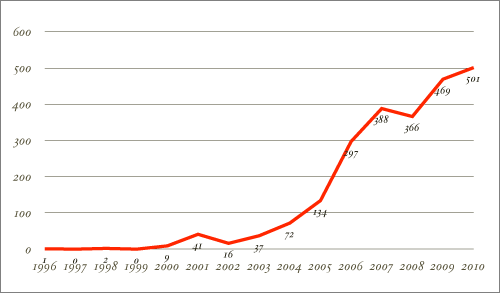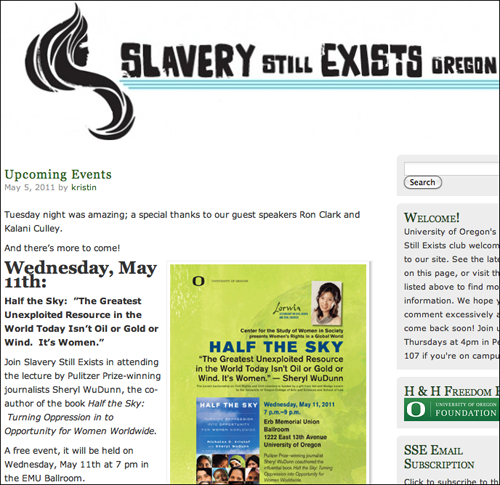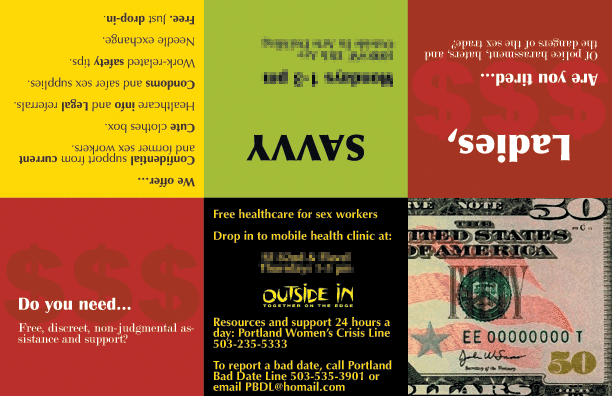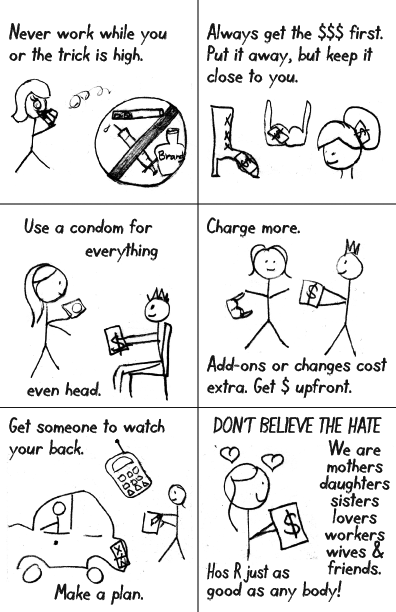Below is an excerpt from my old (2002) zine, Instigations from the Whore Revolution: A Third Wave Feminist Response to the Sex Work “Controversy”. My thinking has evolved and shifted in some ways since I made that zine, but I thought it’d be interesting to share a history of sex workers organizing against the City government.
How Sex Workers Defeated Mayor Vera Katz: Information on Portland City Ordinance 14.44
In September 1999, Portland City Council passed a new ordinance (City Code 14.44) proposed by Mayor Vera Katz and the Portland Police Bureau regarding the personal escort/modeling industry. The ordinance mandated absurd requirements for anyone who worked as a personal escort or model, making her even more vulnerable to abusive customers, police abuse, and discrimination than she already was. It violated sex workers’ right to privacy, patronized their ability to make their own decisions, and seriously compromised their safety.
Local sex workers formed Scarlet Letter, a collective of workers and their supporters, to combat the city ordinance. “Workers need affordable housing, health care with dignity, and protection from mismanagement and harassing authorities,” instead of such a repressive regulation, says its press release. Scarlet Letter later submited “Sex Workers’ Wish List,” the counter-proposal to the City describing a better way to regulate escort/modeling industry.
Sex workers and their allies also waged a legal battle, arguing the City Code 14.44 to be unconstitutional. City modified the ordinance twice to increase the odds of withstanding the legal challenge, but the judge eventually sided with sex workers on March 8. Mayor Katz subsequently abandoned the ordinance.
Even though we were able to defeat this particular ordinance, we know that it could come back in a different form any time, plus sex workers across the country are fighting daily against similar legislation. The information about this ordinance is included here in order to preserve the history of sex workers’ successful organizing.
Absurd Requirements under the Ordinance
Under the City Code 14.44, anyone who works as an escort or a lingerie model must:
- Pay $200 to get a personal escort/model permit that has her headshot.
- Give police their finger prints. – Submit to a criminal background check–permit is denied if she has been convicted of “prostitution-related crimes” in the past five years.
- Keep a telephone log of each customer who calls. – Show the escort/model permit to customers.
- Sign a contract with customer before each appointment that describe specific services provided.
- Make the phone log and contracts available to police inspection without search warrant.
- If she works independently, she must obtain a $500 business license and comply with additional requirements.
Penalties
If a worker is caught in violation of Code:
- It is a Class B misdemeanor ($500 fine/ 6 months in jail) to work without a permit.
- Civil penalties of $100 (for first offense) and $500 (the second) are assessed for each “minor” violation.
- Permit is revoked for any “major” violation, such as failure to pay civil penalty within ten days and accumulating three offense in a single year.
Other Consequences of the Ordinance
- Those with the history of prostitution-related convictions will be ineligible for the permit, putting them further “underground” and at the greater risk of being abused or exploited.
- Those with fewer opportunities to become self-reliant outside of the sex industry will be trapped in poverty and government assistance.
- When uneligible worker is abused, assaulted or exploited on the job, they will be less likely to seek police assistance.
- The existence of public registry of workers’ personal information will make it easier for the customer to harass or stalk her.
- Public record of escort/model permit makes it more difficult for workers to leave sex industry in the future, effectively trapping those who may wish to leave.
Sex Workers’ Wish List
The following is excerpted from Scarlet Letter’s counter-proposal to the city council as to a better way to regulate escort/modeling industry. Of course the City ignored everything we said in this, but it felt good to have a concrete counter-proposal: we aren’t saying that escort/modeling businesses don’t need regulation, but that the regulation proposed by the City was harmful to us.
- Change the title of the permit from “Personal Escort/ Modeling Permit” to “Worker Permit” so that workers can leave the industry without the scarlet letter.
- Use the OLCC beverage/food server application as a model of what a work permit application should look like, including the fees.
- Have escort/models obtain the permit from the Bureau of Licenses and Multonomah County Health Department, instead of Portland Police Bureau.
- Require escort/modeling business management to have a working relationship with Health Department. Raise the standard of awareness of how to decrease one’s risk at the job site. Require job training that addresses disease prevention, safety issues, and current laws that pertain to sex work.
- Hold the management accountable for proper security measures at the job site.
- Remove any unnecessary personal information from the permit application.
- Issue a certificate instead of a photo ID as the permit.
- Remove the automatic rejection of a permit if individual was convicted of a misdemeanor (i.e. prostitution) so that they can engage in sex work legally.
- Police should not be allowed to enter one’s residence without a search warrant.
- Change the punishment of working without a permit to a fine, rather than a misdemeanor.
- Remove unreasonable requirements that escort/models keep the customer’s phone numbers in a log for Police to inspect, and sign a written contract with the customer before each appointment.
Timeline of Our Struggles
September 22, 1999 – City Code 14.44 is introduced by Mayor Katz and the Portland Police Bureau. No sex workers are informed of the proposal.
September 29, 1999 – City code 14.44 passes the City Council with no objections.
November 1, 1999 – First meeting of Scarlet Letter. Open only to workers.
November 8, 1999 – Second meeting of Scarlet Letter. Open to all supporters.
November 14, 1999 – Sex Workers’ Masquerade, a fundraiser for Danzine and Scarlet Letter campaign.
November 15, 1999 – Third meeting of Scarlet Letter, to which a Willamette Week reporter showed up to write an article.
November 17, 1999 – Scarlet Letter speaks out at the City Council.
November 23, 1999 – Emi hosts a panel discussion on sex work at Portland State University, which turned into a pep rally for Scarlet Letter.
December 15, 1999 – Lawsuit is filed to block enforcement of the ordinance.
January 26, 2000 – Scarlet Letter presents the “Sex Workers’ Wish List” to the City Council. Emi was almost arrested for holding up a sign in the Chamber. City Council makes a minor modification to the ordinance, but ignores us for the most part. Willamette Week runs a story that is somewhat favorable to sex workers.
February 4, 2000 – First hearing of the lawsuit against the ordinance.
February 22, 2000 – Judge declares the ordinance invalid under Oregon constitution.
March 8, 2000 – Mayor Katz abandons the ordinance. WE WON!!!!
Emi’s Final Comments
1. It is frustrating that the only thing that stopped the ordinance from being enforced was the constitution. I mean, we worked with the media, tried to educate the City Council, went to City Hall many times, called up people, and even worked with the Multnomah County Health Department to come up with an effective alternative to the ordinance so that the escort/modeling industry is regulated just like all other industries–and the only thing that actually worked was a judge’s order. I guess that’s how the system works in this lawsuit-obsessed country, but I’m really sad that City Council absolutely refused to think, even for a second, that perhaps the Vice Unit of the Portland Police Bureau may not be the expert when it comes to the sex industry.
2. I’m annoyed by the “sex radicals” who celebrate sex workers as strong independent women (or men, or whatever) while neglecting the real suffering of people who are being exploited or abused within the sex industry. And I’m also annoyed by the radical feminist I spoke with who told me how much money sex industry is costing tax payers and how many abortions are taking place as a result of the sex industry as a way to demonize it.
My goal is to empower everyone working in the sex industry, whether they are engaged in commercial or survival sex so that people who wish to leave can have other realistic options and people who wish to stay can have safer, better working environment. So all sex radicals and radical feminists–stop arguing and do something already.
3. Initially, I thought that this ordinance is about inhibited sex moralists versus us freakish folks. In fact, that’s how all the media reported it. But it was not. The reality is that this is not about morality, but is about business owners versus workers. I realized this as I was talking with the City officials.
In fact, it is not true that the City did not consider the legitimate needs of the industry while drafting this ordinance: they talked with people who run the businesses although not the people who work for them, which makes me think that the interests of the owners and managers–but not those of workers–are reflected in the ordinance.
The ordinance would have made it much more difficult for women to work independently without a pimp–which is exactly what the owners and managers want, because it would wipe out the competition for their businesses. The ordinance was never intended to hurt these businesses; the City was trying to enact a system in which workers are under the control of pimps and pimps are under the control of the Police Bureau.
4. Escorts and models still do not have the protection they deserve within the industry. Now that the ordinance is struck down, City of Portland should join Multnomah County in working with us to develop a real regulation that would protect safety and rights of workers. If they don’t–well, everyone who has ever consumed adult entertainment (which is pretty large number of people) should refuse to vote for the current City Council members when they come up for re-election!




